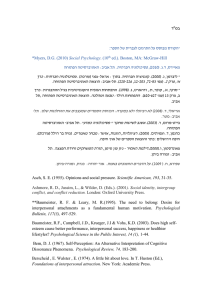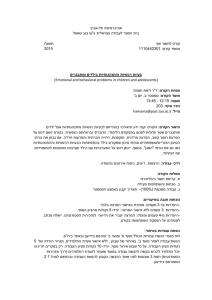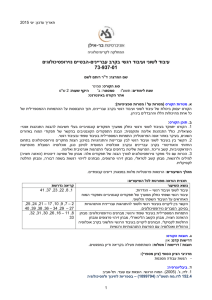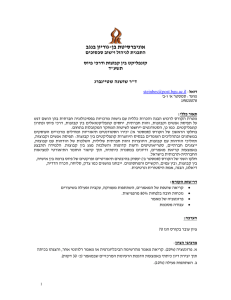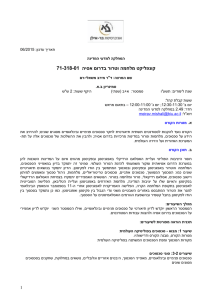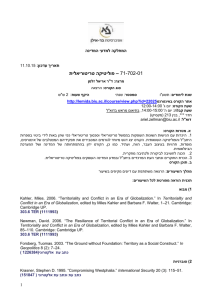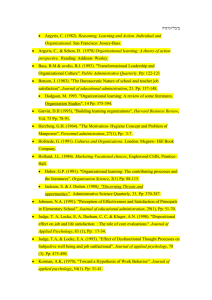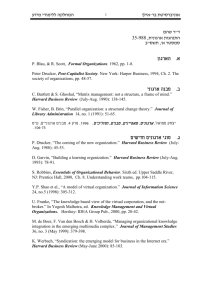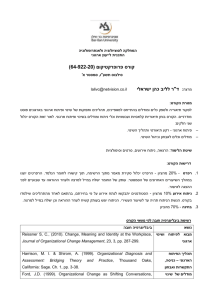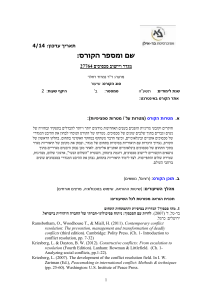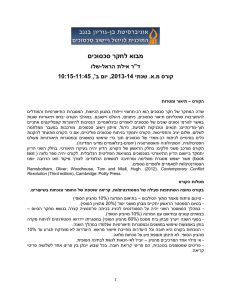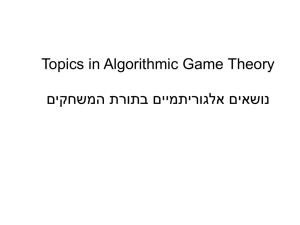27-732 רגשות וקונפליקט - אוניברסיטת בר-אילן
advertisement
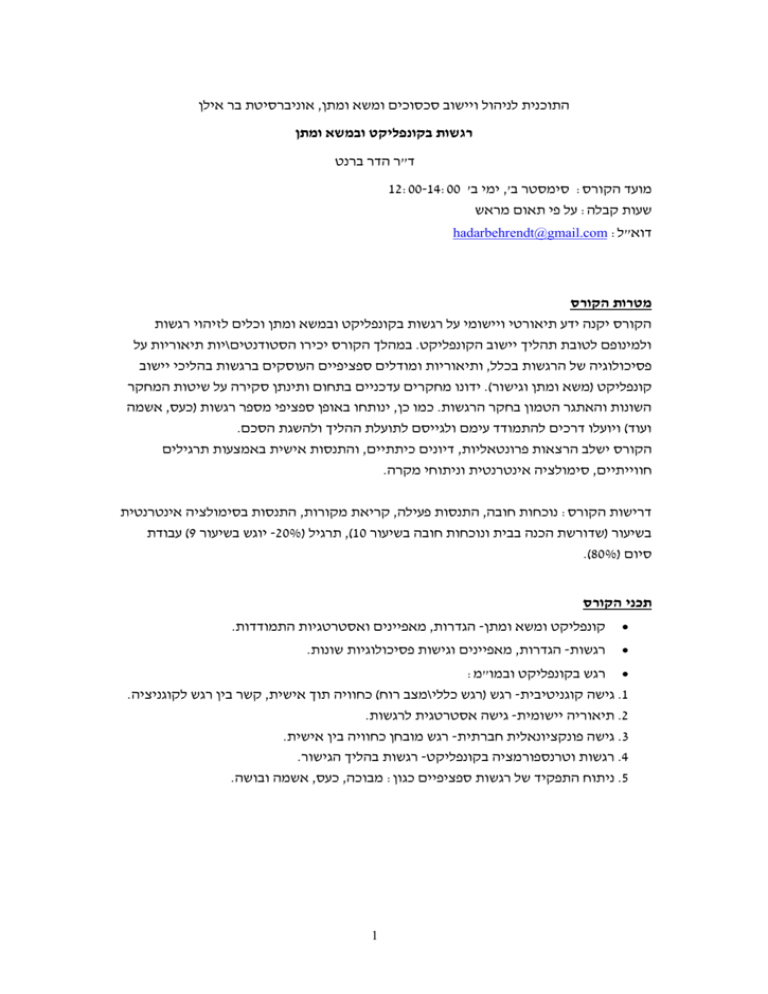
התוכנית לניהול ויישוב סכסוכים ומשא ומתן ,אוניברסיטת בר אילן רגשות בקונפליקט ובמשא ומתן ד"ר הדר ברנט מועד הקורס :סימסטר ב' ,ימי ב' 00:11-00:11 שעות קבלה :על פי תאום מראש דוא"לhadarbehrendt@gmail.com : מטרות הקורס הקורס יקנה ידע תיאורטי ויישומי על רגשות בקונפליקט ובמשא ומתן וכלים לזיהוי רגשות ולמינופם לטובת תהליך יישוב הקונפליקט .במהלך הקורס יכירו הסטודנטים\יות תיאוריות על פסיכולוגיה של הרגשות בכלל ,ותיאוריות ומודלים ספציפיים העוסקים ברגשות בהליכי יישוב קונפליקט (משא ומתן וגישור) .ידונו מחקרים עדכניים בתחום ותינתן סקירה על שיטות המחקר השונות והאתגר הטמון בחקר הרגשות .כמו כן ,ינותחו באופן ספציפי מספר רגשות (כעס ,אשמה ועוד) ויועלו דרכים להתמודד עימם ולגייסם לתועלת ההליך ולהשגת הסכם. הקורס ישלב הרצאות פרונטאליות ,דיונים כיתתיים ,והתנסות אישית באמצעות תרגילים חווייתיים ,סימולציה אינטרנטית וניתוחי מקרה. דרישות הקורס :נוכחות חובה ,התנסות פעילה ,קריאת מקורות ,התנסות בסימולציה אינטרנטית בשיעור (שדורשת הכנה בבית ונוכחות חובה בשיעור ,)01תרגיל ( -01%יוגש בשיעור )9עבודת סיום (.)81% תכני הקורס קונפליקט ומשא ומתן -הגדרות ,מאפיינים ואסטרטגיות התמודדות. רגשות -הגדרות ,מאפיינים וגישות פסיכולוגיות שונות. רגש בקונפליקט ובמו"מ: .0גישה קוגניטיבית -רגש (רגש כללי\מצב רוח) כחוויה תוך אישית ,קשר בין רגש לקוגניציה. .0תיאוריה יישומית -גישה אסטרטגית לרגשות. .3גישה פונקציונאלית חברתית -רגש מובחן כחוויה בין אישית. .0רגשות וטרנספורמציה בקונפליקט -רגשות בהליך הגישור. .5ניתוח התפקיד של רגשות ספציפיים כגון :מבוכה ,כעס ,אשמה ובושה. 1 מקורות קריאה קריאת חובה1 כללי-קונפליקט ומשא ומתן Thomas, W. K. (1992). Conflict and negotiation processes in organizations. in M. D. Dunnette & L. M. Hough (Eds), Handbook of industrial and organizational psychology: 2nd addition (pp. 651-717). Palo Alto California: Consulting Psychologists Press. (קריאת )005-071 חובה רגש כללי\מצבי רוח-גישה קוגניטיבית Barry, B., & Oliver, R. L. (1996). Affect in dyadic negotiation: A model and propositions. Organizational Behavior and Human Decision Processes, 67(2), 127-143. Forgas, J. P. (1998). On feeling good and getting your way: Mood effects on negotiator cognition and bargaining strategies. Journal of Personality and Social Psychology, 74(3), 565-577. גישה אסטרטגית Thompson, L. L., Nadler, J., & Kim, P. H. (1999). Some like it hot: The case for the emotional negotiator. In L. L. Thompson., J. M. Levine & D. M. Messick (Eds.), Shared cognition in organization: The management of knowledge (pp. 139-161). Mahwah, NJ: Lawrence Erlbaum Associates. (039-008 :(קריאת חובה רגשות מובחנים-חברתית-גישה פונקציונאלית Morris, M. W., & Keltner, D. (2000). How emotions work: The social functions of emotional expression in negotiations. Research in Organizational Behavior, 22, 1-50. (21-35 קריאת )חובה. Overbeck J. R., Neale M. A., & Govan, C. L.(2010). I feel, therefore you act: Intrapersonal and interpersonal effects of emotion on negotiation as a function of social power. Organizational Behavior and Human Decision Processes, 112, 126– 139 רגשות וטרנספורמציה בקונפליקט Jameson, J. K., Bodtker, A. M. & Linker, T. (2010). Facilitating Conflict Transformation: Mediator Strategies for Eliciting Emotional Communication in a Workplace Conflict. Negotiation Journal, 25-48. . . צפויים שינויים ועדכונים בחובת הקריאה1 2 )קריאה מומלצת שאינה חובה (מאמרי סקירה Barry, B. 2008. Negotiator affect: the state of the art (and the science).Group Decision Negotiation, 17, 97–105 Barry, B., Smithy-Fulmer, I., & Goates, N. (2006). Bargaining with feelings: Emotionality in and around negotiation. In L. L. Thompson (Ed.), Negotiation theory and research (pp. 99-127). New-York: Psychology Press. הרחבה-מקורות קריאה כללי-קונפליקט ומשא ומתן . אוניברסיטת תל אביב: הוצאת רמות. משא ומתן המימד החבוי.)0115( . א,גלין Rahim, M. A. (1983). A measure of styles of handling interpersonal conflict. Academy of Management, 26(2), 368-376. Rahim, M. A. (2001). Managing conflict in organizations: 3rd edition. Westport, Connecticut: Quorum Books. Ting-Toomey, S., Yee-Jung, K. K., Shapiro, R. B., Garcia, W., Wright, T. J., & Oetzel, J. G. (2000). Ethnic/cultural identity salience and conflict styles in four US ethnic groups. International Journal of Intercultural Relations, 24, 47-81. כללי-רגשות Forgas, J. P. (2002). Feeling and doing: Affective influences on interpersonal behavior. Psychological Inquiry, 13(1), 1-28. Frijda, N. H. (1987). Emotion, cognitive structure, and action tendency. Cognition and Emotion, 9, 617-635. Gross, J. J. (1998). Antecedent and response-focused emotion regulation: Divergent consequences for experience, expression, and physiology. Journal of Personality and Social Psychology, 74(1), 224-237. Keltner, D., & Haidt, J. (1999). Social functions of emotion at four levels of analysis. Cognition and Emotion, 13(5), 505521. Keltner, D., & Gross, J. J. (1999). Functional accounts of emotions. Cognition and Emotion, 13(5), 467-480. Lazarus. R. S. (1991). Emotion and Adaptation. New York: Oxford University Press. Moore, B. S., & Isen, A. M. (1990). Affect and social behavior. In B. S. Moore & A. M. Isen (Eds), Affect and social behavior (pp. 1-22). Cambridge: Cambridge 3 University Press. Niedenthal, P. M., Krauth-Gruber, S., & Ric, F. (2006). Psychology of emotion. What are emotions and how are they studied? (pp. 1-39). New-York: Psychology Press. Schwarz, N., & Clore, G. L. (2003). Moods as information: 20 years later. Psychological Inquiry 14(3&4), 296-303. ספרות תיאורטית-רגשות בקונפליקט ובמו"מ Bodtker, A. M., & Jameson, J. K. (2001). Emotion in conflict formation and its transformation: Application to organizational conflict management. International Journal of Conflict Management, 12(3), 259-275. Jones, T. S. (2001). Emotional communication in conflict. In W. F. Eadie & P. E. Nelson (Eds), The language of conflict and resolution (pp. 81-98). Thousand Oaks, California: Sage Publications, Inc. רגש כללי \ מצבי רוח Carnavale, P. J. D. & Isen, A. M. (1986). The influence of positive affect and visual access on the discovery of integrative solutions in bilateral negotiation. Organizational Behavior and Human Decision Processes, 37, 1-13. Clore, G. L, Schwarz, N., & Conway, M. (1994).Affective causes and consequences of social information processing. In R. S. Wyer & T. K. Srull (Eds), Handbook of social cognition (pp. 323-417). Hillsdale, New Jersey: Lawrence Erlbaum Associates, Publishers. Forgas, J. P., & Cromer, M. (2004). On being sad and evasive: Affective influences on verbal communication strategies in conflict situations. Journal of Experimental Social Psychology, 40, 511-518. Kramer, R. M., Newton, E., & Pommerenke, P. L. (1993). Self-enhancement biases and negotiator judgment: Effects of self-esteem and mood. Organizational Behavior and Human Decision Processes, 56, 110-133. (31) Rhoades, J. A., Arnold, J., & Jay, C. (2001). The roll of affective traits and affective states disputant’s motivation and behavior during episodes of organizational conflict. Journal of Organizational Behavior, 22, 329-345. רגשות מובחנים Friedman, R., Anderson, C., Brett, J., Olekalns, M., Goates, N., & Lisco, C. C. (2004). The positive and negative effects of anger on dispute resolution: Evidence from electronically mediated dispute. Journal of Applied Psychology, 89(2), 369376. . Van Kleef, G. A., De Dreu, C. K. W., & Manstead, A. S. R. (2004). The interpersonal effects of anger and happiness in negotiations. Interpersonal Relation and Group Processes, 86(1), 57-76. 4 Van Kleef, G. A., De Dreu, C. K. W., Pietroni, D. & Manstead, A. S. R. (2006). Power and emotion in negotiation: Power moderates the interpersonal effects of anger and happiness on concession making. European Journal of Social Psychology, 36, 557-581. Van Kleef, G. A., Van Lange, P. A. M. (2008). What other disappointment may do to selfish people: Emotion and social value orientation in a negotiation context. Personality and Social Psychology Bulletin, 34(8), 1084-1095. Lelieveld, G-J., Van Beest, I., & Van Dijk, E. (2013). Does Communicating Disappointment in Negotiations Help or Hurt? Solving an Apparent Inconsistency in the Social-Functional Approach to Emotions. Journal of Personality and Social Psycholoy, 105( 4), 605–620. מבט יישומי-ו"מ Gerben A. Van Kleef University of Amsterdam Fisher, R., & Shapiro, D. (2005). Beyond reason, using emotion as you negotiate. London, Penguin Books. Retzinger, S., & Scheff, T. (2000). Emotion, alienation, and narratives: Resolving intractable conflict. Mediation Quarterly, 18(1), 71-85. Shapiro, D. (2002). Negotiating emotions. Conflict Resolution Quarterly, 20(1), 6782. Thompson, L. L. (1999). The mind and heart of the negotiator. Prantice Hall (pg. 101108) רגשות וטרנספורמציה בקונפליקט Jameson, J. K., Bodtker, A. M., Porch, D. M., & Jordan, W. J. (2009). Exploring the role of emotion in conflict transformation. Conflict Resolution Quarterly 27(2), 167-192. Jameson, J. K., Bodtker, A. M., & Linker, T. (2010). Facilitating conflict transformation: Mediator strategies for eliciting emotional communication in a workplace conflict. Negotiation Journal 26(1), 25-48. רגשות של מודעות עצמית Behrendt, H., & Ben-Ari, R. (2012). The positive side of negative emotion: The role of guilt and shame in coping with interpersonal conflict. Journal of Conflict Resolution, published on line before printMy 17, http://jcr.sagepub.com/content/early/2012/05/16/0022002712445746/ De Hooge, E. I., Zeelenberg, M., & Breugelmans, S. M. (2007). Moral sentiments and cooperation: Differential influences of shame and guilt. Cognition and Emotion, 21(5), 1025-1042 5 Tangney, J. P. (1991). Moral affect: The good, the bad, and the ugly. Journal of Personality and Social Psychology, 61(4), 598-607. Tangney, J. P. (1995). Shame and guilt in interpersonal relationship. In J. P. Tangney & K.W. Fischer (Eds), Self-Conscious emotions: The psychology of shame, guilt, embarrassment and pride (pp. 115-139). New York: The Guilford Press. 6
